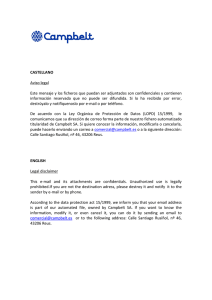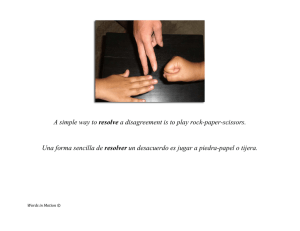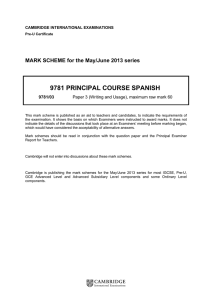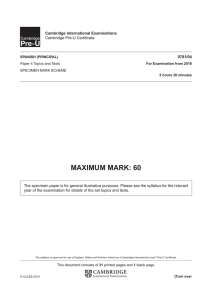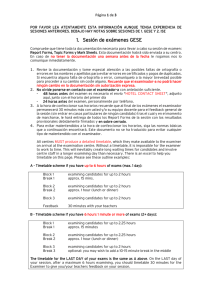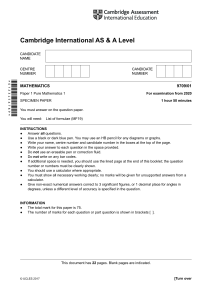maximum mark: 60 - Cambridge International Examinations
Anuncio
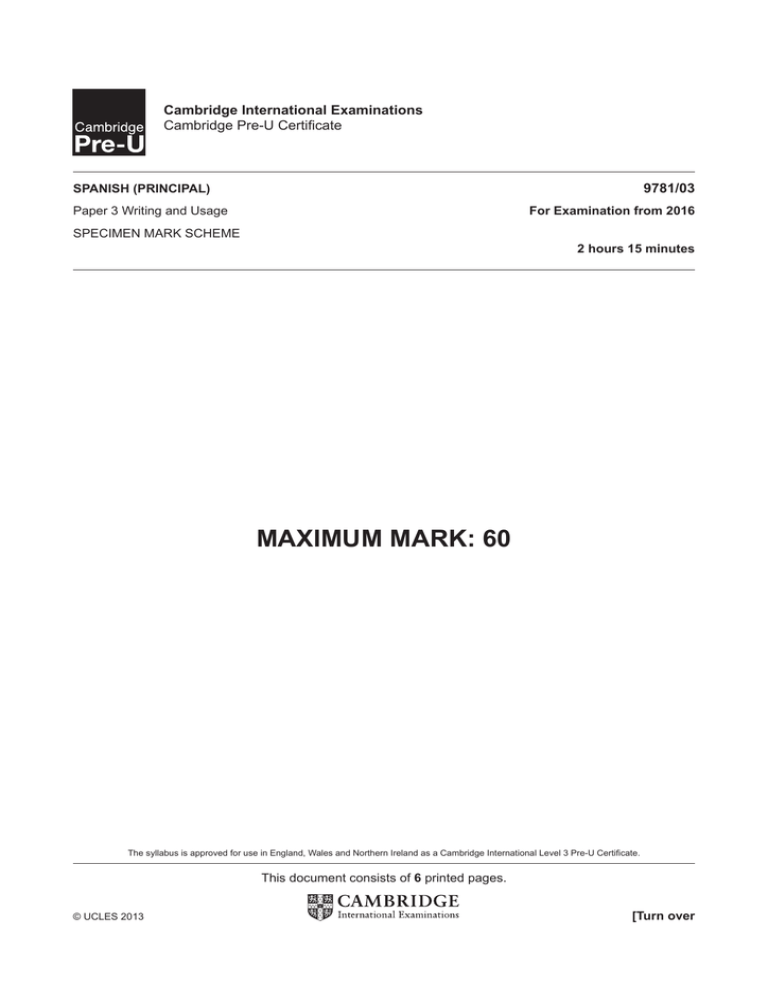
Cambridge International Examinations Cambridge Pre-U Certificate 9781/03 SPANISH (PRINCIPAL) Paper 3 Writing and Usage For Examination from 2016 SPECIMEN MARK SCHEME 2 hours 15 minutes MAXIMUM MARK: 60 The syllabus is approved for use in England, Wales and Northern Ireland as a Cambridge International Level 3 Pre-U Certificate. This document consists of 6 printed pages. © UCLES 2013 [Turn over 2 Part I: Writing (40 marks) • Accuracy and linguistic range: 24 marks: AO2 • Development and organisation of ideas: 16 marks: AO3 Marking grid for accuracy and linguistic range 22–24 Excellent Almost flawless. Excellent range of vocabulary and complex sentence patterns. Good sense of idiom. 18–21 Very good Highly accurate. Wide range of vocabulary and complex sentence patterns. Some sense of idiom. 14–17 Good Generally accurate. Good range of vocabulary and some complex sentence patterns. 10–13 Satisfactory Predominantly simple patterns correctly used and/or some complex language attempted, but with variable success. Adequate range of vocabulary, but some repetition. 6–9 Weak Persistent errors may impede communication. Simple and repetitive sentence patterns. Limited vocabulary. 1–5 Poor Little evidence of grammatical awareness. Inaccuracy often impedes communication. Very limited vocabulary. 0 No relevant material presented. Marking grid for development and organisation of ideas 15–16 Excellent Implications of question fully grasped. Ideas and arguments very effectively organised, illustrated with relevant examples. Wholly convincing. 12–14 Very good Most implications of question explored. Ideas and arguments well organised, illustrated with relevant examples. Coherent argument. 9–11 Good Main implications of question explored. Organisation generally clear but lacking coherence in places. Some relevant examples. Some ability to develop argument. 6–8 Satisfactory Some implications of question explored. Patchy or unambitious organisation, but with some attempt at illustration. Some irrelevant material. 3–5 Weak Limited understanding of question. A few relevant points made. Rambling and/or repetitive. Ideas and arguments poorly developed. Poor Minimal response. Implications of question only vaguely grasped. Very limited relevant content. Disorganised, unsubstantiated and undeveloped. 1–2 0 © UCLES 2013 No relevant material presented. 9781/03/SM/16 3 1 Discursive essay Indicative content Candidates are free to interpret the question in any way they wish. The following notes are not intended to be prescriptive but to give an indication of some of the points which could be made in response to the question. They are by no means exhaustive. (a) Un 44% de los menores en edad escolar ve la televisión entre las diez y las doce de la noche. ¿Deberían intervenir los padres? This open-ended question offers candidates the possibility of answering in many different ways. Some could discuss whether parents should be held responsible for the actions of their children, and whether a relaxed approach to discipline is detrimental, or even morally acceptable. They could discuss the importance of preventing children watching programmes which are not suitable for their age. They could argue that children have the same rights as adults and that broadcasting companies should not show programmes which can have a negative influence. They could write about the impact that prolonged exposure to unsuitable programmes could have on children and society at large. They might wish to provide examples of different approaches to parenting. Conclusion. (b) “Los libros y las bibliotecas están destinados a desaparecer.” Discute esta afirmación. The topic of ‘traditional’ learning tools such as books and libraries versus new media could be approached from a number of angles, which ultimately centre on the choice between virtual space, the internet, wikipedia and the most costly and traditional way to store information, the library. Will technology and commodity kill the joy of reading a book? Candidates might argue in favour of or against the changes we are witnessing at present. They should justify their answer. Conclusion. (c) Delante del papa Benedicto XVI en Barcelona, un centenar de homosexuales se besaron en público. ¿Qué opinas de esto como una forma de manifestarse? Candidates might have different views on this question, which centres on the Catholic Church’s view on homosexuality. They could say that in the 21st century the Church needs to accommodate the needs of society. Candidates might wish to show their awareness of other problems and explore their belief in possible changes and their impact on society as a whole. Others could highlight different ways of protesting against injustice. They should justify their answer. Conclusion. (d) La violencia de género también afecta a los hijos. ¿Cómo debemos protegerlos? This essay centres on the topic of domestic violence and the effect it has not only on women, but also on children. Some candidates could argue that it is the responsibility of the government to make sure the most vulnerable are protected, while others could claim that we live in a world where keeping family together, no matter what, is most important. Candidates might wish to show their awareness of the way domestic violence incidents are reported in the media and their influence on the younger generation. They might wish to discuss the role of grandparents and the influence of social workers. Conclusion. © UCLES 2013 9781/03/SM/16 [Turn over 4 (e) Hay quienes dicen que las crisis económicas solucionan el “problema” de la inmigración. Da tu opinión, justificando tu respuesta. Candidates should discuss whether they think that the current economic crisis will deter immigrants from coming to Europe in search of a better life. They could argue that the shortage of jobs has a knock-on effect on human trafficking. Some could argue that as we are all citizens of the globe all movement between countries should be permitted. They could give particular examples of the different types of immigration in the European Union, and mention the laws created by European governments which limit the numbers of legal immigrants. They should justify their answer. Conclusion. © UCLES 2013 9781/03/SM/16 5 Part II: Usage (20 marks) Ejercicio 1 Q. Nr. Accept Mark Reject 2 se puso [1] se ponía 3 hará / va a hacer [1] no accent 4 estudiaría [1] habría estudiado / no accent 5 haber reservado [1] 6 tengan [1] [Total: 5] [AO2] Ejercicio 2 Q. Nr. 7 8 9 10 11 Accept Mark No creo que me guste / vaya a gustar tu ciudad. [1] Por no hablar inglés / el hecho de que no habla inglés no consiguió el trabajo. [1] Llovió con tanta fuerza que el pueblo se inundó. [1] Dos mujeres fueron atropelladas por un ciclista el viernes por la tarde. [1] La empresa para la que / para la cual / donde / en que / en la cual / en la que trabajo es boliviana. Reject me gustará porque no habla inglés / por causa de que / por que no habla inglés atropellados por la que / quien / para quien / para que [1] [Total: 5] [AO2] © UCLES 2013 9781/03/SM/16 [Turn over 6 Ejercicio 3 (One tick for each, then see conversion table below.) Q. Nr. Correct option Correct response 12 A olvidarse 13 B de 14 A haya 15 D casi 16 C sin embargo 17 B conocer 18 A por debajo de 19 C siendo 20 A alto 21 B debido 22 C relacionados 23 B declararon 24 D hambrientos 25 A favorable 26 A cualquier 27 D ni 28 D se 29 B es 30 C sino 31 A televisivas Conversion table Number of ticks Mark 19–20 10 17–18 9 15–16 8 13–14 7 11–12 6 9–10 5 7–8 4 5–6 3 3–4 2 1–2 1 0 0 [Total: 10] [AO2] © UCLES 2013 9781/03/SM/16

